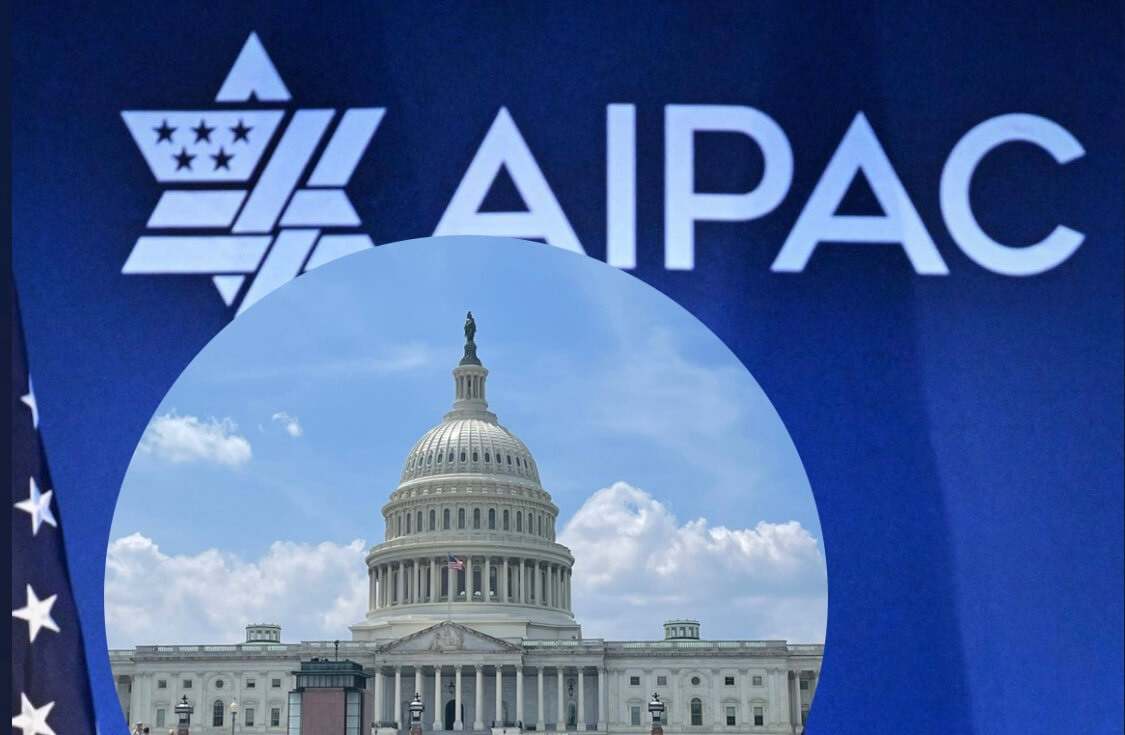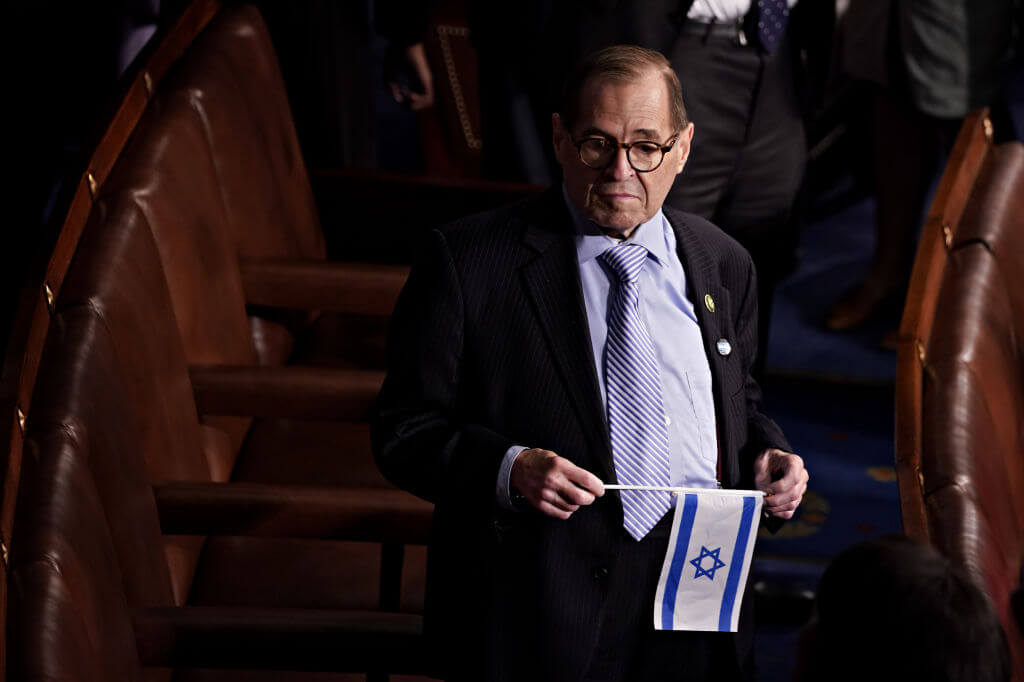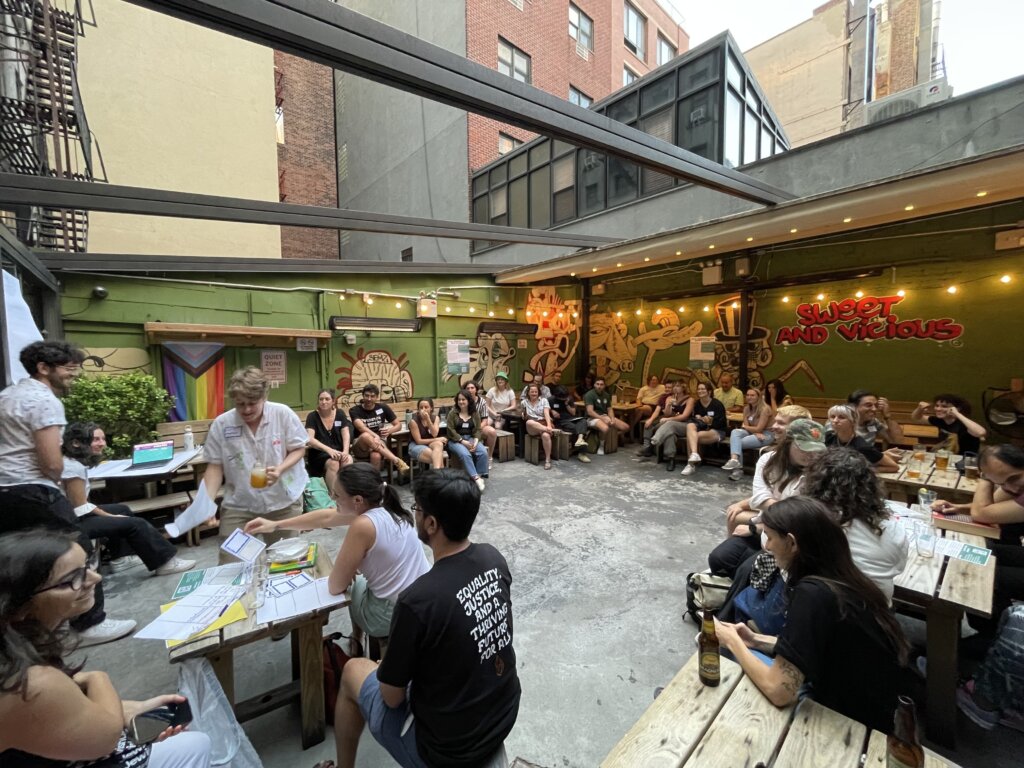A progressive Jewish group is pressuring Democrats to reject AIPAC endorsements
IfNotNow has targeted, among others, Jewish New York Reps. Jerry Nadler and Dan Goldman

A photo of the U.S. Capitol on July 19, 2023, superimposed on a program from the American Israel Public Affairs Committee policy summit on June 5, 2023. Photo by Mandel Ngan/AFP via Getty Image and Jacob Kornbluh
Activists affiliated with IfNotNow, a group opposed to the Israeli occupation, launched a campaign Tuesday to pressure Democratic New York members of Congress to refuse endorsements and financial contributions from the American Israel Public Affairs Committee.
The effort is part of a national “Reject AIPAC” campaign IfNotNow launched last month to target federal lawmakers residing in states with large Jewish populations.
The focus on AIPAC, for many years the undisputed leader in pro-Israel advocacy in the U.S., may resonate as the landscape of Jewish political advocacy shifts. American Jews, generally repulsed by anti-democratic movements in the U.S. and Israel, where a hard right government is pursuing a package of reforms that will undermine the balance of power there, want pro-Israel groups to take a strong pro-democracy stance.
The 40 activists spearheading the campaign to reject AIPAC said they want to show that the lobby group misrepresents American Jews. IfNotNow and other AIPAC critics fault its endorsement strategy, tepid criticism of Israel’s government and failure to call out Israel for its treatment of Palestinians.
On the target list in New York are Jerry Nadler, the dean of the informal congressional Jewish caucus; and Dan Goldman, a freshman Democrat who represents Brooklyn and the Lower East Side. Both congressmen were backed by AIPAC. But while Nadler was also endorsed by the liberal pro-peace J Street, Goldman benefited from a large AIPAC contribution — $350,000 — that went to a local super PAC opposing one of his progressive competitors in the race. Goldman is also closely aligned with AIPAC. He met his wife, Corinne Levy Goldman, at an AIPAC young leadership event in 2012.

AIPAC spokesperson Marshal Wittmann said the group “will not be deterred by fringe, anti-Israel groups” in their effort to support “Democrats and Republicans who understand the importance of strengthening the relationship between the United States and Israel.” Wittman added that AIPAC expects to “fully engage in the democratic process” in future elections.
Endorsements aplenty
For the first time since its founding in 1963 to strengthen the U.S.-Israel alliance, AIPAC in 2022 began to endorse congressional candidates, releasing a list of 365 mostly Democratic and Republican incumbents. The move came in for fierce criticism because the list included more than 100 Republicans who refused to certify the 2020 presidential election.
AIPAC also faced backlash for helping to fund primary candidates it deemed more staunchly pro-Israel than their Democratic rivals — even when those rivals were incumbents. Its affiliated United Democracy Project super PAC spent $28 million in highly competitive Democratic primaries, including $1 million in the general election against Rep.-elect Summer Lee, a progressive Democrat from Pennsylvania.
The endorsements marked a dramatic change from years past, in which AIPAC would privately request position papers on Israel from first-time candidates and scrutinize the voting records of incumbents. It would then recommend candidates deemed sufficiently supportive of Israel to its financial backers, according to insiders familiar with the process.
Last year, however, candidates might have had no contact at all with AIPAC before they received an endorsement, which, the lobbying group said, was based exclusively on their positions and actions concerning the U.S.-Israel relationship. Though some Democratic House members were surprised by AIPAC’s endorsement, none publicly disavowed it.
AIPAC trivia
In the backyard of a Manhattan Chinatown bar Tuesday, as the 40 IfNotNow activists discussed strategy for their anti-AIPAC campaign, news came of an indictment in the more than yearlong investigation of Donald Trump’s efforts to overturn the 2020 election. The development, the activists noted, aligned with their cause, in that AIPAC had endorsed 109 Republicans who voted to overturn the election.

“AIPAC is directly supporting the extremists working to dismantle our democracy and disenfranchise the most marginalized people in this country,” said Matan Arad-Neeman, IfNotNow’s communications director.
Michaela Davenport, a member of IfNotNow’s NYC chapter, said she realized AIPAC was “promoting a fictional narrative about Israel” when she attended an AIPAC progressive students retreat during her college years. “AIPAC is willing to jeopardize our democracy to sustain that false narrative,” she said, explaining why she had volunteered for the campaign.
At the two-hour event, attendees also played an AIPAC trivia game. They flubbed several questions, including ones on the year the pro-Israel group was founded and what the AIPAC abbreviation stands for.
Eva Borgwardt, IfNotNow’s political director, expressed her appreciation for the turnout at the event. She said an increasing number of American Jews are now coming to realize AIPAC’s alignment “with racists and antisemites.”
IfNotNow’s campaign is largely focused on New York, Philadelphia, Massachusetts, Chicago, California and Washington, D.C., where AIPAC and IfNotNow are based. But it has also encouraged people across the nation to push their representatives to reject an AIPAC endorsement.
“It should be an easy choice,” Borgwardt said.























